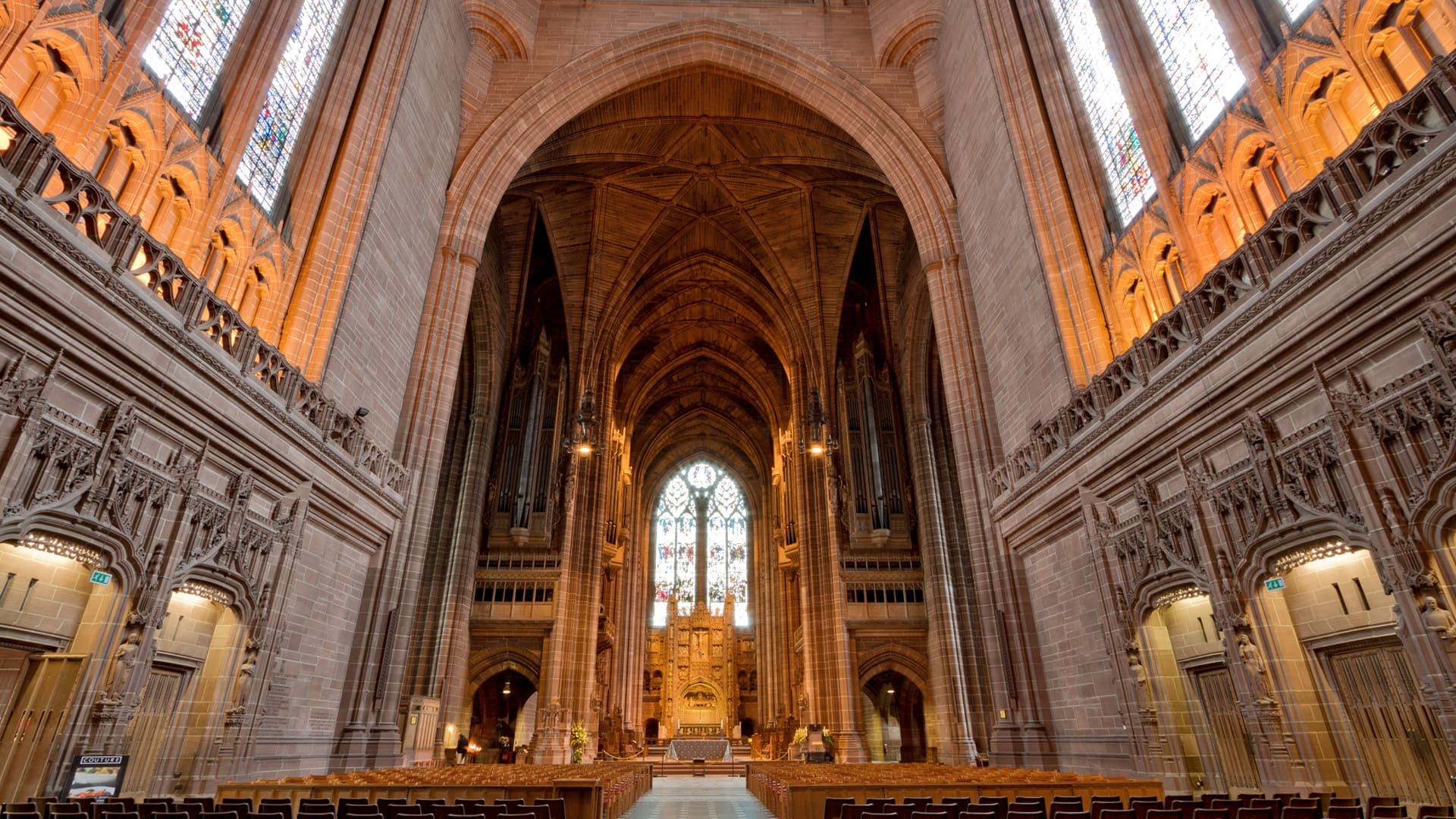“Why Anglicanism?” It is a question that I have heard with increasing frequency, and doubtlessly will continue to hear over and over throughout my Christian journey. My burgeoning association with the Anglican church has raised many a brow. Certainly, at times, said brows are not merely raised but decisively furrowed. “Why Anglicanism?” The tonal accent landing precisely on that word—Anglicanism—as if some sort of dirty word passed through one’s lips, or as if a curse was evoked upon my Christian faith, or even as if one’s mother was insulted.
“Anglicanism” need not be a dirty word, and it is far richer than the caricature cast by those who abuse its heritage (and lets admit it, the heresy that plagues much of Anglicanism also plagues other denominations as well). Anglicanism, at it’s best, is beautiful.The Anglican Communion isn’t itself a church. It’s a family of churches, spread across 165 countries, with around 85 million members.
I have many reasons for affiliating with the Anglican church but I will focus on a few that sealed the deal for me. They are mostly theological, and practical. Let me also say this as a qualifier: Anglican does not necessary have to mean robes, incense, bells, and cathedrals (and it does not mean that for St. Peter’s Fireside, however partial I may be to these things). It can be very Evangelical, and “contemporary” (for lack of a better word).
There is not one aspect of the human experience that the gospel does not impact, and Anglican spirituality seeks to embrace this reality.
First and foremost, I am an Anglican and have aligned myself with the Anglican church because it is gospel-centered. It reads Scripture with a salvation focus, understanding that the gospel is how we are saved, how we are transformed, and how the entire cosmos is ultimately reconciled to God. There is not one aspect of the human experience that the gospel does not impact, and Anglican spirituality seeks to embrace this reality. It seeks to apply the gospel to all areas of the human experience forming our bodies, minds and senses as we stand, kneel, speak, hear, taste, touch, smell and sing. It seeks to transform our experience of time, as the Church calendar roots us in the story of the gospel. In short, every effort is made so that people might fully inhabit the gospel of God, because it is the center of our faith and salvation.
Secondly, I consider myself an Anglican because the Christian faith is Scripturally and historically bound. Anglicanism keeps Scriptural primacy, yet embraces what can be affirmed throughout history, rooting the Church in the Creeds and Apostolic faith. Rather than a narrow, critical view of tradition, Anglican embraces Scripture’s dynamic approach to tradition. Within the Gospels, Jesus critiques the traditions of the elders, and quite harshly. But Paul also speaks positively of apostolic tradition. Anglicanism rightly embraces this, and approaches theology first from Scripture, then tradition, then reason and finally experience. Tradition can serve as a safeguard for navigating the challenges of culture and testing modern interpretations of Scripture. Yet the tradition affirmed by Anglicanism will never contradict what is revealed in Scripture, and if it does it will be corrected.
Thirdly, the Anglican church offers a robust missiology. It rightly sees missiology flowing inseparably from ecclesiology and the Trinity. The church is not solely an instrument to be used by God for his purposes. When the “mission” ends—narrowly understood as evangelism and reaching the nations—at the consummation and return of Christ, the Church still remains because it has an ontological significance—it is the body and bride of Christ. The ultimate mission of the Church never ceases: giving praise to God’s glory. Anglican worship is structured around this distinct understanding: the mission of the Church is to be what it is, the body of Christ. The entire arc of the liturgy is rooted in the people of God as gathered and commissioned people, who are set apart for the sake of the world.
Fourthly, Anglicanism offers a holistic understanding of discipleship, especially in light of how people actually change. James K. A. Smith makes a brilliant argument in his book, Desiring the Kingdom that people are not fundamentally “thinking-beings,” or even “believing-beings,” but “desiring-beings.” The way we derive a sense of identity, meaning and purpose is not simply through our cognitive faculties, but also through non-cognitive processes. It is the social structures and stories that we embody that shape these non-cognitive levels, which ultimately shape the intention and aim of our hearts. This is precisely what liturgy does, Mark Gallis writes,
Liturgy teaches about the story … but it does more, it also embodies the Christian story in its very structure.
The Anglican church has structured worship to create routines, rituals and rhythms to enter into the gospel story. These rituals and rhythms shape us both on the cognitive level and the non-cognitive level, ultimately calibrating our hearts to be pointed towards God’s kingdom. Hence, liturgical worship can also become the framework for discipleship. Simon Chan suggests, “Personal devotional habits should be understood as a necessary preparation for better participation in common prayer.” Traditionally through catechesis, a believer is trained in the Apostles Creed, the commandments, and the Lord’s prayer; and they are trained not just to understand these things, but to enter into worship. Sunday worship that includes confession, absolution, intercessory prayer, and the like, teaches believers how they can worship day to day. These are repeatable forms of worship, which makes discipleship more holistic. There is no gap between what one does on Sunday or on her own on Tuesday morning.
Finally, I consider myself Anglican because its liturgical heritage offers an enduring form of transformative worship. The English Church’s place in the Reformation is unique as Cranmer attempted not just theological reform, but also to reform worship by rooting its forms in the earliest Church Fathers. Anglican worship creates a stable form of worship that connects me with Christians around the world. It roots me into forms of worship that have been celebrated for centuries, and its entire shape is gospel-centered and Biblically grounded. And, as I have mentioned in the previous two points, Anglicanism offers a form of worship that enhances discipleship and roots people in God’s mission. Anglican worship at its best understands the proclamation of the Word and the celebration of Eucharist as intertwined necessities if the gospel is going to be proclaimed fully, and received faithfully.
The ultimate mission of the Church never ceases: giving praise to God’s glory.
I am convinced that the liturgical bent of Anglicanism is one of its great strengths, and that it need not be inaccessible. At the heart of the liturgical Reformation lay the desire to make worship comprehensible to the average, common person. Unfortunately some Anglican parishes have forgotten that even though our worship is now in the common language, its forms and theology are no longer common language in a post-Christian context and they require additional explanation. I truly believe that the enduring, trans-generational nature of the liturgy offers a profound worship experience, and it can be very accessible if it simply is explained. Its accessibility will depend on how well people are led into it.
At the end of the day, the Church is fundamentally a worshiping community. Through Anglican worship, the church is thoroughly centered and rooted in the gospel. It celebrates liturgy that has endured throughout the ages. It participates in the life of Christ through the proclaimed Word and Eucharist, and is shaped by the liturgy to become mature disciples that participate in God’s continuing mission. Anglicanism sees the Church’s ontological value rather than diminishing the Church solely to its instrumental use. Furthermore, in light of how people change, liturgical worship deeply affects us on the cognitive and non-cognitive level, which points our hearts towards God’s kingdom. Liturgy also offers holistic discipleship, which transcends Sunday worship alone.
This is a vision for the Church, and it is a powerful vision. As a church planter, this is the vision I aspire to see come to fruition as I believe it can thrive in a post-Christian context. I fully agree with Bishop Todd Hunter’s summary of “why Anglicanism?” He writes, “The convergence of the evangelical, Spirit-filled and liturgical elements of Christianity are leading to the spiritual formation and mission that I dreamed of, worked toward and hoped for.”
This post is a summary of a 12 page white paper, if you would like to read the full paper you can download it here. You may also want to read: Misconceptions of Anglicanism and The Dangers of Anglicanism. To find a gospel-centered Anglican church in Canada or America visit anglicanchurch.net




